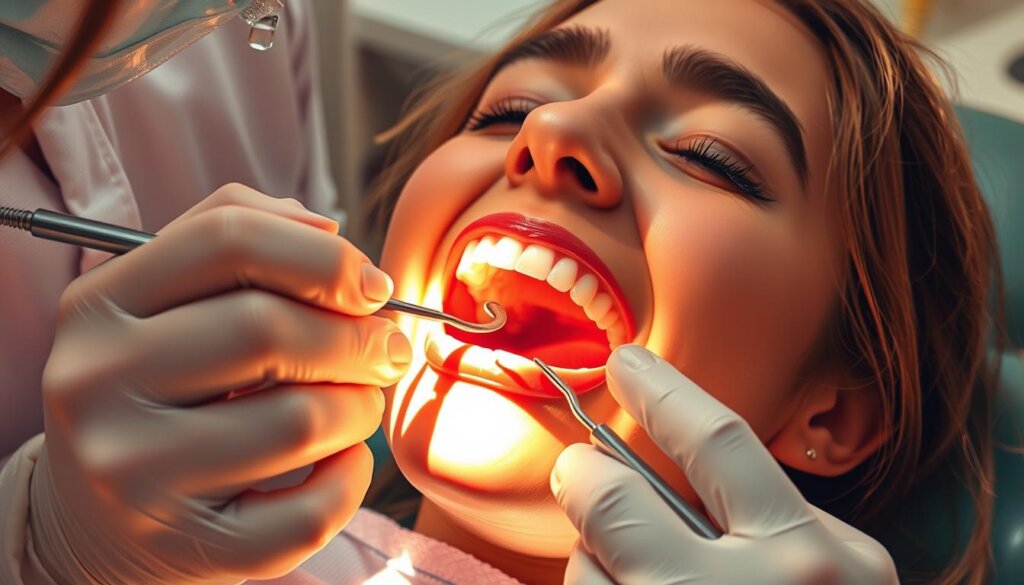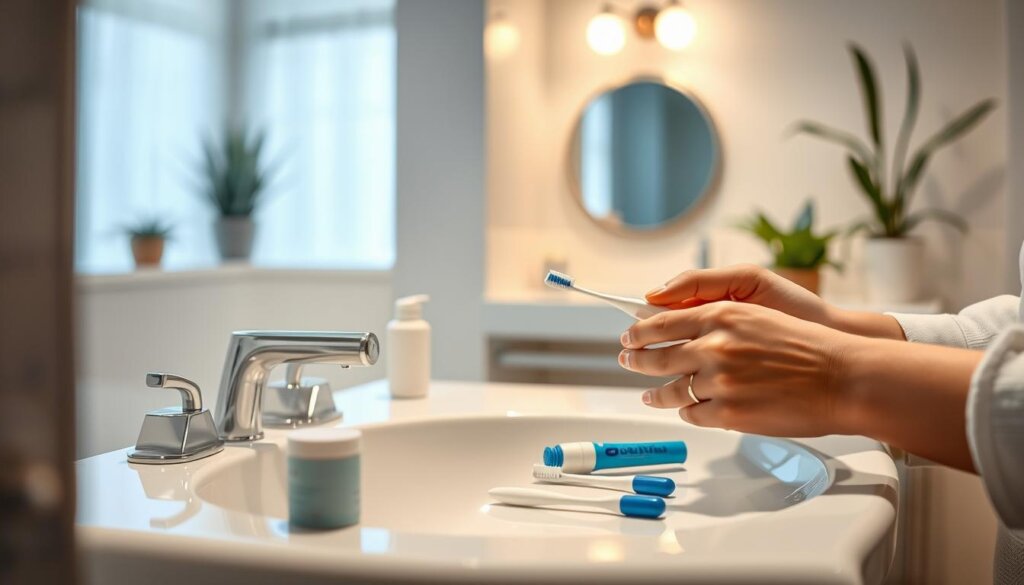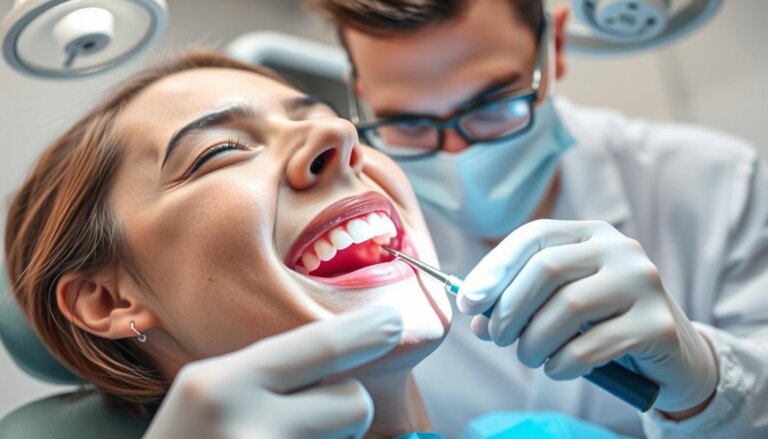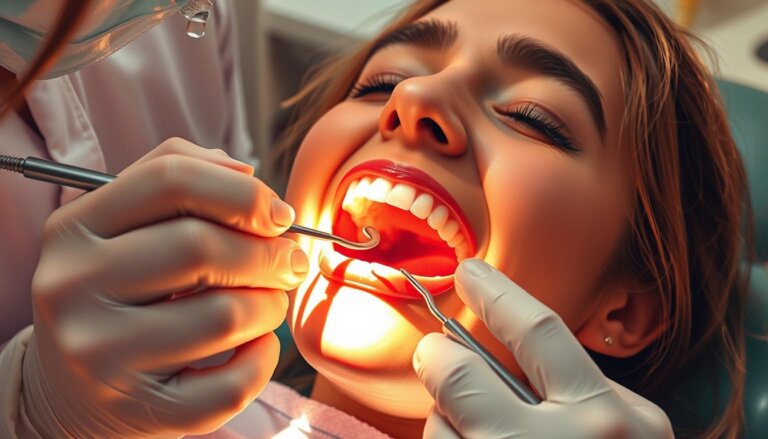How Long Does a Dental Exam and Cleaning Take?
Did you know that a dental exam and cleaning is about more than just keeping your smile bright? It’s important in San Diego, CA for maintaining both oral health and overall well-being. Dental professionals usually need 30 to 60 minutes for this. The time needed for a dental hygiene appointment can change based on what you need. This includes looking in your mouth, cleaning your teeth, and maybe taking X-rays. Each patient gets care that suits their needs, for the best dental health.
When you go for a dental exam and cleaning, the check-up part is quick, lasting 10 to 15 minutes. Cleaning can take a bit longer, from 15 minutes to 30 minutes or more. If your gums are not healthy or if you have a lot of tartar, it might take extra time. Adding X-rays can also make your visit 10 to 15 minutes longer.
For new patients or those getting a full check-up, expect to stay over an hour. This lets your dentist thoroughly review your medical history and plan your treatment. Other steps like deep cleanings, lots of X-rays, looking for cancer, or making a detailed treatment plan will also make your visit longer.
Key Takeaways
- Standard dental exams and cleanings typically range from 30 to 60 minutes.
- Initial examination, thorough cleaning, and potential X-rays are critical components of a comprehensive visit.
- Personal oral health conditions dictate the exact dental hygiene appointment duration.
- In-depth procedures such as scaling, root planing, and cancer screenings can extend the appointment time as needed.
- For first-time or comprehensive exams involving a full medical history review, the visit could exceed 60 minutes to ensure thoroughness.
Understanding Dental Exams and Cleanings
Regular dental exams and cleanings play a key role in keeping our mouths healthy. Knowing what happens during these visits helps us understand their value. This contributes to overall well-being.
What is a Dental Exam?
A dental exam checks your oral health in great detail. Dentists use tools like mirrors to look for cavities and gum disease. The aim is to fix any issues early to keep your mouth healthy.
What is Included in a Cleaning?
Cleanings remove plaque and tartar, even if you brush and floss well at home. Dentists often use ultrasonic scaling. This makes cleanings more comfortable and effective.
Purpose of Routine Dental Visits
Visiting the dentist regularly for exams and cleanings has two main benefits. These visits keep your mouth healthy and prevent diseases. They’re a key part of staying healthy overall.
Typical Duration of a Dental Exam
Knowing how long a dental exam might take is key. It helps with planning your day. The length varies because everyone’s teeth and oral health are different.
Factors Affecting Exam Length
A dental check-up’s time can differ for a few reasons. Your dental history is one main factor. People with a lot of dental work might need more time. Also, if you need X-rays, that adds extra time to your visit.
Average Time of a Standard Exam
Normally, a dental exam takes about 30 to 60 minutes. This includes checking your teeth, screening your gums, and a basic cleaning. But if the dentist needs to talk more about what they find or do a treatment, it might take longer.
Talking to your dentist about what you need can help. It helps make sure there’s enough time for everything. This way, you and your dentist will know what to expect.
Typical Duration of a Dental Cleaning
The time it takes to clean your teeth at the dentist’s office can differ a lot. Factors like how much tartar you have and your daily teeth cleaning habits play a big role. It’s important for both dentists and patients to know about how long the cleaning will take. This helps everyone get ready for the visit.
Since everyone’s teeth are different, dental cleanings can vary in length. Some people might be in and out quickly. But those with a lot of plaque may need a longer visit to get their teeth clean.
On average, getting your teeth cleaned regularly helps keep them healthy. It stops serious problems with gums and teeth decay from happening.
- Standard Teeth Cleaning: Usually takes about 40 to 45 minutes.
- Deep Cleaning (Scaling and Root Planing): This might require more than one appointment, each lasting 60 to 90 minutes depending on the condition.
- Ultrasonic Cleaning: Utilizes advanced technology to make the cleaning process faster, often shortening the cleaning time.
Thanks to new tools like ultrasonic scalers, dental cleanings are less uncomfortable. They also take less time than before.
Getting your teeth cleaned regularly by a dentist is key to preventing dental problems. The time you spend in the dentist’s chair is a small investment for healthy teeth and gums in the future.
The time needed for dental cleanings can vary. But knowing these differences helps everyone set the right expectations. Getting the balance right between doing a thorough job and being efficient is key for good dental health.
Combined Duration of Exam and Cleaning
Dental clinics often pair exams and cleanings in one visit. This saves time and checks a patient’s oral health in one go. It’s important for patients to know how long these visits usually take.
Dental exams and cleanings are planned to go smoothly, reducing waiting for the patient. The aim is to do checks and treatments well within the time given.
Estimated Total Time
A typical dental visit for an exam and cleaning lasts 45 minutes to 1 hour. This time lets dentists do a full check-up and clean thoroughly, ensuring good care.
This method makes visits quicker and more comfortable for patients. They get all the oral health services they need in a short and efficient visit.
First-Time Dental Visits and Duration
When you schedule your first dental appointment, be ready for it to take longer than usual. The first visit includes detailed check-ups to start off your oral health care journey.
What to Expect on Your First Visit
The first visit is comprehensive. It starts with a detailed look at your medical history. This helps understand any issues that might affect dental care.
Your dentist will do a full examination to check for decay, gum disease, and other problems. They might also take x-rays to see the health of your teeth and jawbone.
Potential Time Differences for New Patients
A first visit, including a dental check-up and teeth cleaning, usually takes longer than follow-up visits. This is because new patients need a thorough assessment. This assessment can make the visit last from 45 to 60 minutes or more. This time could increase if you need special tests like oral cancer screenings.
- Review of medical history and discussion of dental concerns
- Thorough dental examination including diagnostic x-rays
- In-depth teeth cleaning
- Development of a personalized treatment plan
Plan to arrive a bit early and keep your schedule flexible. This first visit is crucial for setting up a care plan customized just for you.
Special Cases That May Alter Time Taken
In the dental world, certain cases can make appointments last longer. It’s key for both patients and dental experts to know this to set the right expectations.
Some people need more time due to dental fears or complex issues. They need care that differs from the usual, which means they spend more time in the chair.
Patients with Dental Anxiety: Dental anxiety is common and can extend how long the visit takes. Those who are anxious often need extra time to get comfortable. A gentle, patient approach from the staff is essential, though it makes the visit longer.
Complex Dental Issues: Folks with serious dental problems might also need longer visits. Issues like bad gum disease or needing several fillings require a deep look and careful planning, so the visit takes more time.
Addressing these unique situations shows why being flexible and empathetic matters in dental care. It makes sure everyone gets the thorough treatment they need.
Importance of Regular Dental Checkups
Good oral health is more than just a nice smile. It’s key to your overall well-being. Regular dental checkups are essential. They keep your teeth and gums healthy. They also catch health problems early.
Knowing how long a dental exam and cleaning take can help you fit them into your schedule. On average, these appointments last 45 to 90 minutes. The exact time depends on your oral health and what treatments you need.
Benefits of Consistent Care
- Early detection of dental issues such as cavities, gum disease, and even oral cancer.
- Prevention of tooth decay and gum disease, which are among the leading causes of tooth loss.
- Maintenance of overall health, noting the link between oral diseases and other systemic conditions like diabetes and heart disease.
Preventative Measures
- Regular cleanings to remove plaque and tartar that can lead to gum disease.
- Comprehensive examinations to assess the health of teeth and gums.
- Fluoride treatments and dental sealants as added protective measures against decay.
Making regular dental checkups a part of your health routine is smart. It improves oral health and avoids complex, expensive procedures later. This forward-thinking approach is a good investment in your long-term health.
Choosing the Right Dental Practice
Finding the right dental practice is key for good dental care. This choice affects not just your check-up quality but also how long your teeth cleaning takes. Checking a clinic’s quality and efficiency ensures your visits are up to standard and not too time-consuming.
- Location Convenience: The practice should be easy to get to, making regular visits simple.
- Qualifications of Dentists: Dentists with high training and experience ensure thorough and skilled care for various dental issues.
- Range of Services: A clinic that offers many services can handle everything from regular check-ups to special treatments.
The dental team’s experience should meet your expectations. The dentists’ qualifications and how they manage time during check-ups can greatly affect satisfaction and results.
An experienced dentist makes each session efficient. They provide quality care quickly, respecting your time. This is vital for people with busy schedules. Also, knowing how long teeth cleaning takes helps with planning your visits.
Taking care of your dental health is important for your overall health. Choosing the right clinic is a big decision. Make sure the dental practice matches your needs in expertise, services, and time efficiency. This leads to better health results and a happier healthcare experience.
Preparing for Your Dental Visit
Getting ready for your dental visit begins long before you arrive. Good preparation can make your visit shorter without giving up care quality. Here are key tips to prepare for your next dental checkup.
Having the right papers and info ready can avoid delays. It’s key to bring updated medical history, a list of current meds, and dental insurance info. This helps the dental staff serve you better and customizes your care.
Also, cleaning your teeth well before your visit matters. Brushing and flossing make the cleaning at the dentist quicker. Here’s more on what to bring and how to prep:
- Medical and Dental Records: Bring any important medical and dental history, like recent surgeries or treatments.
- List of Medications: List all your current meds, as they may impact your dental treatment.
- Insurance Details: Have your insurance card and any needed forms ready.
- Questions for Your Dentist: Write down any concerns or questions about your dental health. It ensures you don’t forget to ask important questions.
For a quicker dental visit, try these steps:
- Confirm your appointment the day before and arrive early to finish any last paperwork.
- Keep up with good oral hygiene to shorten cleaning time.
- Be open and honest about your dental habits and any issues for a faster diagnosis.
These steps not only help manage your appointment time but also improve your visit’s success. By coming prepared, you help make sure your dental care is timely and effective.
Understanding Your Dental Insurance
Knowing how your dental insurance works is key. It helps you plan for dentist visits and manage costs better. Dental plans help with the bills, but they come with rules and coverage details that need attention.
Most dental plans cover exams and cleanings since they prevent bigger dental problems later. By knowing this, you can use your insurance to pay for most, if not all, of these visits.
Dealing with dental insurance details can be tricky, especially about coverage limits, co-pays, and choosing between in-network or out-of-network dentists. Here’s how these factors can affect your dentist visits and costs:
- Coverage Limitations: Most insurances have a yearly max amount. This can limit how often you go without paying extra.
- Pre-authorization Requirements: Some treatments need approval first. This can impact when you get care.
- Direct Billing: Many dentists bill your insurance directly. This makes paying for visits easier and faster for you.
Getting to know these details of your dental plan can make visits shorter and more efficient. It’s smart to talk to your dentist’s billing staff before your appointment. This way, you can clear up any confusions, making your visits smooth and affordable.
Understanding your dental insurance can save you money. It also makes dental care easy to get and on time. This is good for keeping your teeth healthy.
Signs It’s Time for a Dental Visit
Knowing when to see a dentist is key for good oral health. Many symptoms signal it’s time to get checked. These include tooth pain, sensitivity to hot or cold, and swollen gums. Also, if your bite changes or sores won’t heal, it’s essential to take action.
But not every sign involves pain. Sometimes, it’s about sticking to a schedule to avoid problems. It’s critical to know how often to go to the dentist based on your age and oral health.
- For kids and teens, a dentist visit every six months is best unless they need more care.
- Adults should see the dentist at least once a year. If you have ongoing issues, visits may be twice a year.
- Older adults may need to go more often to keep an eye on their dental health as they age.
Customizing your dental visits to fit your needs is vital. This includes looking at your dental history, current issues, and lifestyle. Regular check-ups help dentists clean teeth, update care plans, and fix small problems before they get worse.
Keeping Track of Your Dental Health
Keeping a well-organized record of your dental visits is important for maintaining dental health. It’s good to note down each appointment, what was done, and any advice from your dentist. These notes help you keep track of your oral health and make smart decisions for future care.
It’s crucial to regularly check and update these records. This ensures your dental hygiene appointment duration is just right to stop problems before they get worse. By writing down every dental visit, you create a useful history that helps take care of your teeth in the long run.
- Document dates and details of each visit
- Note specific treatments carried out
- Record dentist’s advice and future recommendations
Setting reminders for your next visits is also very important. Getting reminded on time helps you stick to your check-up and cleaning schedule. This makes dental treatments and prevention more effective.
- Set reminders a week before the scheduled appointment
- Review dental records quarterly to ensure compliance with dental advice
- Adjust the frequency of reminders based on individual dental needs
Staying ahead with these actions is essential for maintaining dental health. It’s especially true for keeping up with dental hygiene routines and appointment times. This all-around way helps you keep your teeth healthy and prevents the need for big treatments later.
Conclusion: Plan Your Dental Visits Effectively
To keep your mouth healthy, knowing about your dental check-up is key. These visits can last from 30 minutes to an hour on average. But this time can change based on your oral health and specific needs. Make sure you set aside enough time for your appointment. Also, be ready for anything that might make your visit longer, like complicated dental problems or if it’s your first time.
Recap of Important Points
We learned that the time needed for dental exams and cleanings can vary. That’s why it’s important for you to plan ahead. Choosing a dentist that knows your dental history well matters a lot. It makes your visit better. Also, get ready by knowing your dental insurance and by following a good tooth care routine. This helps prevent dental issues and leads to better dental health.
Final Thoughts on Dental Care Timing
Regular dental visits are key to stopping dental problems before they start. They’re crucial for keeping your mouth and overall health good. By planning your dental visits well, knowing your insurance details, and keeping track of your dental health, you help protect yourself from dental diseases. Understanding how to fit dental care into your life shows how much our company wants to improve health care knowledge and keep your health in good shape.








